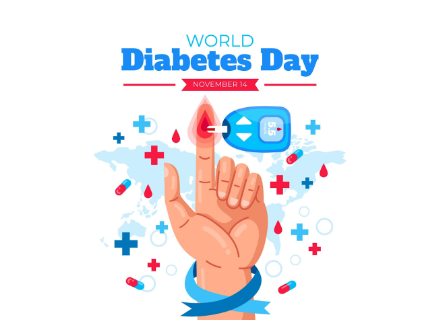By: Geraldus Sigap
November marks Diabetes Awareness Month, a time dedicated to educating the public about a condition that affects millions of people around the world. Diabetes is a chronic disease that impacts how the body processes blood sugar, also known as glucose. High blood sugar levels over time can lead to serious health complications, including heart disease, kidney damage, and nerve problems. With the theme of “Prevent, Manage, Thrive!” this year, the focus is on empowering individuals to take control of their health through prevention, effective management, and living their best lives even with diabetes.

Figure 1. World Diabetes Day
Indonesia is experiencing a significant increase in diabetes cases. According to the International Diabetes Federation, as of 2021, approximately 10.8% of Indonesian adults aged 20-79 years were living with diabetes, totaling over 19 million individuals. This figure places Indonesia among the countries with the highest number of diabetes cases globally. Alarmingly, a substantial portion of these cases remains undiagnosed. Estimates suggest that more than half of diabetes cases in Indonesia are not identified, particularly among younger populations. This lack of awareness and diagnosis can lead to complications, as individuals may not receive timely treatment or make necessary lifestyle adjustments.
Diabetes occurs when the body cannot effectively use or produce insulin, a hormone that helps regulate blood sugar. There are three main types of diabetes: type 1, type 2, and gestational diabetes. Each type has different causes and treatment approaches.
- Type 1 Diabetes: An autoimmune condition where the immune system attacks insulin-producing cells in the pancreas. This type usually appears in childhood or adolescence, and individuals with type 1 diabetes need to take insulin for life.
- Type 2 Diabetes: The most common form, occurring when the body becomes resistant to insulin or does not produce enough of it. Type 2 diabetes is often linked to lifestyle factors, such as being overweight or inactive, but genetics also play a role. It is more common in adults but is increasingly being diagnosed in children and teenagers.
- Gestational Diabetes: This type develops during pregnancy and usually goes away after the baby is born. However, women who have had gestational diabetes have a higher risk of developing type 2 diabetes later in life.
Understanding which type of diabetes you have or may be at risk for is essential to taking appropriate preventive or management steps. Diabetes Awareness Month encourages everyone to educate themselves about the risk factors and symptoms, as early detection can significantly improve outcomes.
The good news is that type 2 diabetes is often preventable through lifestyle changes. Even small adjustments in diet, exercise, and daily habits can lower your risk. Here are some key prevention strategies:
- Eat a Balanced Diet: Focus on eating whole, unprocessed foods. A diet rich in vegetables, fruits, lean proteins, and whole grains can help keep blood sugar levels stable. Limit your intake of sugary beverages, refined carbohydrates, and unhealthy fats, which can increase your risk of diabetes.
- Stay Physically Active: Regular exercise helps the body use insulin more efficiently. Activities such as walking, swimming, cycling, or strength training can lower blood sugar levels and improve overall health. Aim for at least 30 minutes of moderate exercise most days of the week.
- Maintain a Healthy Weight: Being overweight or obese is one of the biggest risk factors for developing type 2 diabetes. Losing even a small amount of weight can have a big impact on reducing your risk. Work with your healthcare provider to set realistic weight loss goals if needed.
- Stay Hydrated: Drinking plenty of water throughout the day can help maintain proper bodily functions and reduce cravings for sugary drinks, which can spike blood sugar.
- Monitor Your Blood Sugar Levels: If you are at high risk for diabetes, consider getting your blood sugar levels checked regularly. Early detection can help prevent the progression of the disease and allow for timely intervention.
Diabetes Awareness Month 2024 is a great opportunity to assess your lifestyle and consider ways to lower your risk of developing diabetes. Even small changes, such as choosing healthier snacks or taking short walks during the day, can make a significant difference.

Figure 2. Active lifestyle to prevent diabetes
If you are living with diabetes, effective management is key to preventing complications and leading a healthy life. The goal is to keep blood sugar levels within a target range, and this often requires a combination of healthy eating, physical activity, medication, and regular monitoring. Here are some tips to help manage diabetes successfully:
- Follow a Meal Plan: Eating the right foods at the right times can help keep blood sugar levels stable. Work with a dietitian to create a personalized meal plan that fits your lifestyle and health needs. The plan should include a balance of carbohydrates, proteins, and fats, as well as an emphasis on fiber-rich foods.
- Stay Active: Physical activity is not only beneficial for preventing diabetes but also for managing it. Exercise helps lower blood sugar and can improve insulin sensitivity. Remember to consult your doctor before starting a new workout routine, especially if you are on insulin or other medications.
- Take Medications as Prescribed: Some people with diabetes may need medication or insulin therapy to control their blood sugar levels. It is important to follow your doctor’s instructions and take your medication regularly. Do not skip doses, as this can cause dangerous fluctuations in blood sugar levels.
- Monitor Blood Sugar: Checking your blood sugar regularly helps you understand how your body responds to different foods, activities, and medications. It also allows you to catch any spikes or drops early. Your healthcare team can teach you how to use a glucose meter and help you understand your target range.
- Manage Stress: Stress can raise blood sugar levels, so finding ways to relax and unwind is crucial. Activities such as yoga, meditation, deep breathing exercises, or simply taking a walk in nature can help reduce stress.
- Stay Educated: Diabetes management is a lifelong journey, and staying informed about your condition can empower you to make better choices. Attend diabetes education classes, join support groups, or read reliable sources of information to stay up to date.
Diabetes does not have to stop you from living a full and active life. With proper management and a positive mindset, you can thrive. Here are some ways to live well with diabetes:
- Set Realistic Goals: Setting achievable health goals can keep you motivated. Whether it is losing a few pounds, walking a certain number of steps each day, or learning a new healthy recipe, small accomplishments can lead to big improvements over time.
- Celebrate Your Progress: Living with diabetes requires effort and dedication. Celebrate your wins, whether it is maintaining steady blood sugar levels, staying active, or simply making healthier food choices.
- Stay Connected: Do not face diabetes alone. Surround yourself with a supportive network of family, friends, and healthcare professionals. They can provide encouragement and help you stay on track.
- Travel Smart: Diabetes does not mean you cannot travel. With a bit of planning, you can enjoy vacations and trips just like anyone else. Pack enough medication, snacks, and a blood sugar monitor, and research healthcare facilities at your destination in case of emergencies.
At RS Abdi Waluyo, our internal medicine specialists are dedicated to providing comprehensive diabetes care. From early detection and prevention strategies to advanced management techniques, our team is here to support you at every stage. We offer personalized treatment plans tailored to your unique needs, ensuring that you receive the best possible care.
Our state-of-the-art facilities and experienced medical staff make RS Abdi Waluyo a trusted choice for those living with diabetes. Our internal medicine department provides a full range of services, including nutritional counseling, medication management, and regular health check-ups to keep your diabetes under control. We also focus on patient education, empowering you with the knowledge and tools needed to manage your condition and live a healthy, active life.
Resources
- Medify T. Medify – World Diabetes Day [Homepage on the Internet]. Medify. 2022 [cited 2024 Nov 11];Available from: https://www.medify.net/world-diabetes-day/
- Press Release| American Diabetes Month |ADA [Homepage on the Internet]. [cited 2024 Nov 10];Available from: https://diabetes.org/newsroom/press-releases/american-diabetes-month-help-fight-growing-diabetes-epidemic
- American Diabetes Month [Homepage on the Internet]. [cited 2024 Nov 10];Available from: https://www.apha.org/events-and-meetings/apha-calendar/2024/11-american-diabetes-month
- World Diabetes Day [Homepage on the Internet]. World Diabetes Day. [cited 2024 Nov 10];Available from: https://worlddiabetesday.org/
